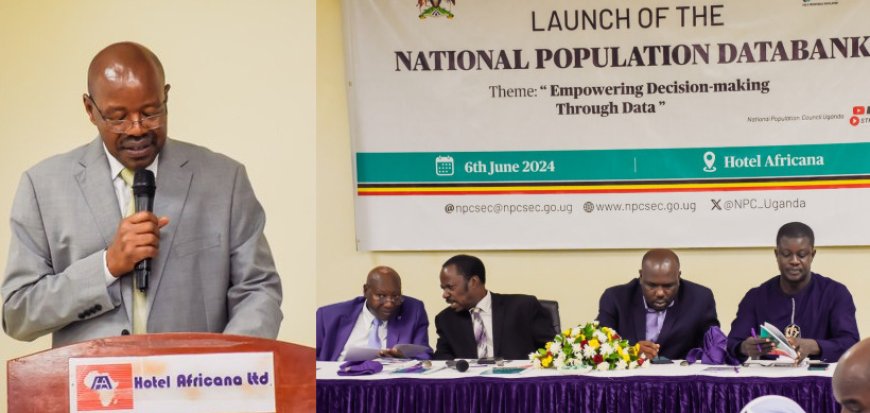NPC unveils the Population Data Bank to strengthen evidence-based planning

The National Population Council of Uganda (NPC) has on Thursday 6th June 2024 launched a population data bank platform aimed at transforming population data access and usage, driving informed decision-making, and fostering sustainable development across our nation among other benefits.
National Population Databank according to NPC will harness data to inform policy decisions and ensure sustainable development for various sectors of the country.
The theme of the launch is: “Empowering Decision-making Through Data”
During the launch of the population data bank held at Africana Hotel, The Minister Of State For Finance, Planning, And Economic Development (Planning) Hon. Amos Lugoloobi, emphasized that the National Population Databank will support Uganda in harnessing the power of data and facilitating economic Planning in various sectors including health care, educations among others.
“Access to precise population data will enable better allocation of resources, target investments, and stimulate economic activities in the regions that need it most, in the health sector, the data bank will support understanding the demographic trends and allow projection and forecasting of healthcare needs, optimizes the distribution of medical resources, and improves health outcomes for all Ugandans,” he said
The Minister said that the National Population Databank will provide a comprehensive understanding of the population dynamics, demographics, and socio-economic indicators to the country to design targeted interventions that address the specific needs of different populations.
The Acting Director General NPC Uganda, Mr. Samuel S. Omwa said that the Databank is a one-stop center offering accurate, reliable, and timely population data for planning, policy formulation, and more.
“Population data is a cornerstone of a country’s development agenda and is essential for appropriately planning, implementing, and evaluating development initiatives. Our Databank provides critical indicators for the economy, education, population, and health sectors, with data visualization for trend insights. Access to detailed population data down to the parish level, reports, and research studies are all included” he said
The Deputy Chairperson NPC, Prof. Florence Mirembe while giving her remarks at the launch highlighted that the data bank addresses the issue of reliance on fragmented data sources which she said have been hindering the ability to make informed decisions, adding that that the data bank gives a holistic view of Uganda's population
She said that the National Population Council has spearheaded the campaign for harnessing Uganda’s demographic dividend over the years, by highlighting the interplay between changes in the population age structure, economic growth, and development
“The theme for this launch event is Empowering Decision Making Through Data. It reminds us of the National Population Databank’s potential to transform governance, drive economic growth, address social inequalities, enhance disaster preparedness, and promote transparency. By harnessing the power of data, the National Population Council is paving the way for a more informed, equitable, and resilient society. The Databank catalyzes positive change, empowering decision-makers to create a better future for all” she said
During a presentation, the National Population Databank Mr. Kakeeto Madani from NPC said that the features and functionality of the platform will help provide Improved Policy formulation, Decision Making & Efficient Resource Allocation.
Mr. Kakeeto said that the National databank has 230 indicators from the different sectors such as health, education, population, Energy, agriculture, environment, economy, minerals, and energy among others.
He mentioned some of the benefits of the data bank including; Improved Policy formulation, Decision Making & Efficient Resource Allocation especially for the government, Market Research Customer Insights to businesses, Program Planning, Impact Assessment for NGOs, access to Reliable Data, Enhanced Analysis for Researchers, the general public and access to Reliable Data to the media among other sectors.












